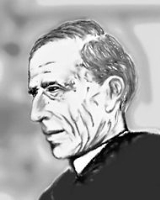
Pierre Teilhard de Chardin
Pierre Teilhard de Chardin (1 May 1881 – 10 April 1955) was a French Jesuit priest trained as a paleontologist and a philosopher, and was present at the discovery of Peking Man.
Sourced
- We only have to look around us to see how complexity and psychic temperature are still rising: and rising no longer on the scale of the individual but now on that of the planet. This indication is so familiar to us that we cannot but recognize the objective, experiential, reality of a transformation of the planet as a whole.
- The Heart of Matter (1950)
- There is neither spirit nor matter in the world; the stuff of the universe is spirit-matter. No other substance but this could produce the human molecule. I know very well that this idea of spirit-matter is regarded as a hybrid monster, a verbal exorcism of a duality which remains unresolved in its terms. But I remain convinced that the objections made to it arise from the mere fact that few people can make up their minds to abandon an old point of view and take the risk of a new idea. ... Biologists or philosophers cannot conceive a biosphere or noosphere because they are unwilling to abandon a certain narrow conception of individuality. Nevertheless, the step must be taken. For in fact, pure spirituality is as unconceivable as pure materiality. Just as, in a sense, there is no geometrical point, but as many structurally different points as there are methods of deriving them from different figures, so every spirit derives its reality and nature from a particular type of universal synthesis.
- A Sketch of a Personalistic Universe.
- The reality of spirit-matter is inevitably translated into and confirmed by a structure of the spirit.
- A Sketch of a Personalistic Universe.
- Since once again, O Lord, in the steppes of Asia, I have no bread, no wine, no altar, I will raise myself above those symbols to the pure majesty of reality, and I will offer to you, I, your priest, upon the altar of the entire earth, the labor and the suffering of the world.
Receive, O Lord, in its totality the Host which creation, drawn by your magnetism, presents to you at the dawn of a new day. This bread, our effort, is in itself, I know, nothing but an immense disintegration. This wine, our anguish, as yet, alas! is only an evaporating beverage. But in the depths of this inchoate Mass you have placed — I am certain, for I feel it — an irresistible and holy desire that moves us all, the impious as well as the faithful to cry out: "O Lord, make us one!"- Prayer for Easter Sunday in the Ordos Desert of Inner Mongolia published in article “The Priest Who Haunts the Catholic World” Saturday Evening Post (12 October 1963)
- The day will come when, after harnessing space, the winds, the tides, gravitation, we shall harness for God the energies of love. And, on that day, for the second time in the history of the world, man will have discovered fire.
- Peking, February 1934, "The Evolution of Chastity" in Toward the Future, London: Collins, 1975: 86-87.
- By virtue of creation, and still more the incarnation, nothing here is profane for those who know how to see.
The Phenomenon of Man (1955)
- Le Phénomène Humain (1955)
- We are not human beings having a spiritual experience; we are spiritual beings having a human experience.
- Paraphrased variant: We are not human beings on a spiritual journey. We are spiritual beings on a human journey.
- Both the quote and the paraphrase of it have sometimes become misattributed to Stephen Covey who quotes the first version in Living the 7 Habits : Stories of Courage and Inspiration (2000), p. 47, and also to Wayne Dyer, who has often quoted it in his presentations.
- Paraphrased variant: We are not human beings on a spiritual journey. We are spiritual beings on a human journey.
- Love alone is capable of uniting living beings in such a way as to complete and fulfill them, for it alone takes them and joins them by what is deepest in themselves. All we need is to imagine our ability to love developing until it embraces the totality of men and the earth.
- A universal love is not only psychologically possible; it is the only complete and final way in which we are able to love.
- If there were no internal propensity to unite, even at a prodigiously rudimentary level — indeed in the molecule itself — it would be physically impossible for love to appear higher up, with us, in hominized form. . . . Driven by the forces of love, the fragments of the world seek each other so that the world may come into being.
- Our century is probably more religious than any other. How could it fail to be, with such problems to be solved? The only trouble is that it has not yet found a God it can adore.
